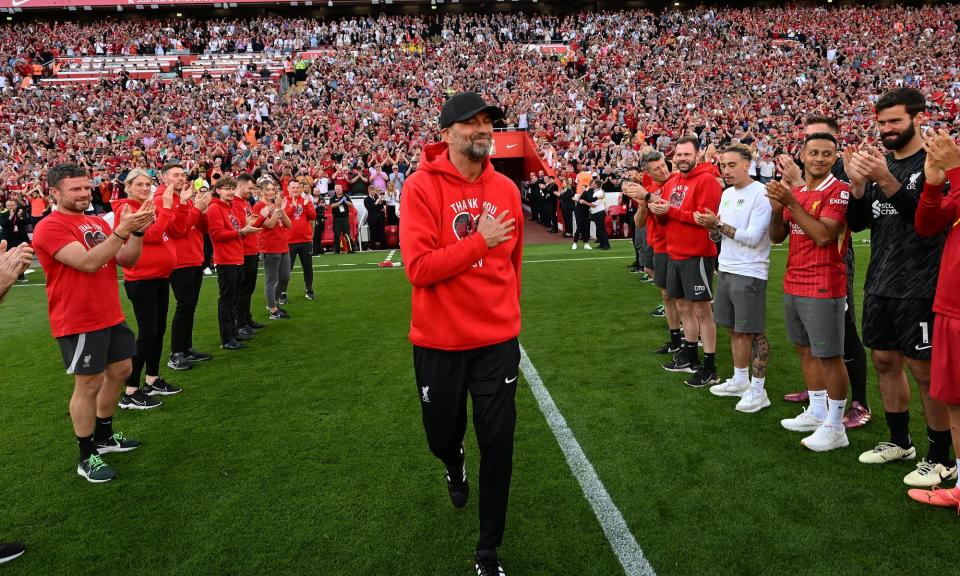Jürgen Klopp made Liverpool elite again after years of faded grandeur

There was a game of football at Anfield on Sunday, and Liverpool, despite missing countless chances, as they have done consistently over the past couple of months, won it 2-0. But nobody seemed to care too much; even Gary O’Neil was restrained in his reaction to the video assistant referee intervening for Nelson Semedo’s yellow card to be upgraded to a red. It was only last week that Wolves called for the review system to be abolished: if you come at the VAR you’d best not miss.
Related: Jürgen Klopp signs off at Liverpool with emotional Anfield win against Wolves
But beneath a sky of perfect unbroken blue, this was not a day on which the game or the league table mattered; this was a day for saying goodbye, and saying thank you. “Danke Jürgen,” as the tifo running round two sides of the ground read, culminating with a heart on the Kop in the colours of the Germany flag. Liverpool knew that, whatever happened, they would finish third. That’s three places higher and, as it turned out, 20 points more than they had managed in 2014-15, the last full season before he took over, but the improvement he has wrought has been far greater than that, the outpouring of affection for him, expressed in the five-minute rendition of “I’m so glad Jürgen is a red” over the final whistle, entirely appropriate and understandable.
Most important, Klopp ended the 30-year wait for a league title, while also adding a sixth European Cup/Champions League, as well as bringing an FA Cup and two League Cups. But even those details feel meagre. The temptation is to look at his trophy haul and ask: Is that it? But success in football is not always measured in silverware.
Klopp has reinvigorated Liverpool. He took the yearning seen in the runners-up season under Brendan Rodgers, nurtured it and satisfied it.
He has made Liverpool an indisputably elite club again after the long years of faded grandeur. There is no need now for their fans always to hark back to the days of Shankly and Paisley; the Klopp years have their own distinct flavour.
It might not be so garlanded with silverware as the golden years of the late 70s and early 80s, but this is a different world: you take your glory as you find it. There have been the great performances, the games that will never be forgotten, from the 4-3 Europa League win over Borussia Dortmund in 2016 to the 3-0 Champions League success against Manchester City in 2018 to the 4-0 comeback against Barcelona in the second leg of the Champions League semi-final in 2019.
And memories are no small thing; trophies may be tangible tokens of success, they may be the point of the whole enterprise, but it is the games that fans will recall in quiet moments decades from now.
When the details of the victory over Tottenham in the 2019 final are long forgotten, Trent Alexander-Arnold’s quickly taken corner for Divock Origi in the semi-final will continue to replay in the mind, as fresh as it ever was. But more even than that, what will be recalled are those periods of five or 10 or 15 minutes, the visceral stirring even neutrals felt when Liverpool came in a great red tide to overwhelm opponents.
But the lack of trophies must be discussed. The criticism that Klopp is a Pisgah coach, forever leading his side to within sight of glory without actually delivering the promised land, is not entirely unfair.
He does have an unfortunate habit of losing in finals, not only to Real Madrid and Bayern, but to Sevilla and Wolfsburg, while his Mainz side twice missed out on promotion in vaguely farcical circumstances.
It’s true that at each of the three clubs he’s managed, Klopp has faced vastly better-resourced rivals and that even to challenge was an achievement, but equally there has been a habit of tightening up at key moments.
Related: Farewell Jürgen Klopp: his incredible Liverpool career – in pictures
And yet there’s a paradoxical sense that the near misses almost add to Klopp’s appeal. Certainly the Premier League has reason to be grateful that he’s provided a challenge to Manchester City, prevented to an extent the league becoming just a series of processions. But sublime failure has its own appeal, particularly when the opponent is a side such as City, with all the advantages they enjoy. Glory isn’t always to the victors; even in the tawdry world of modern football there is honour to be had in playing the game well. It can be debated whether it’s fair for City’s critics to dismiss them as boring, but nobody ever levelled that accusation at Klopp’s Liverpool.
Most careers in football management end in failure, with the apologetic knife or the agonisingly protracted wait for a contract to expire long after the good days have passed into memory. There will be those who see this season, a third-place finish adorned by the Carabao Cup, as an anticlimax. But not many managers get to say goodbye like this, still loved even after eight and a half years by the fans he described as “the superpower of world football”, with an entire stadium rising in adulation. If this isn’t success, success may not be worth having.

